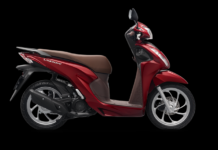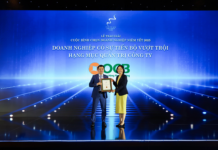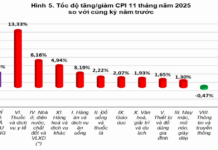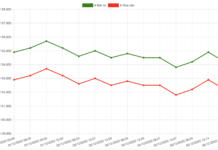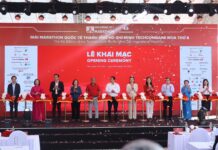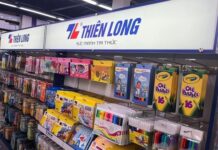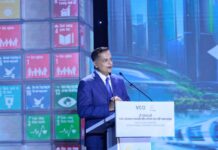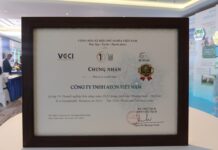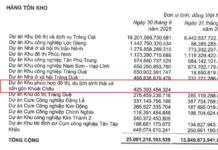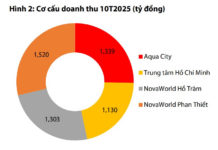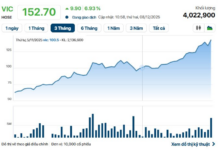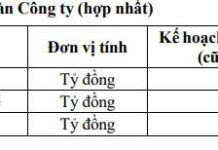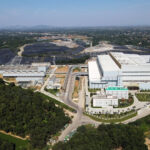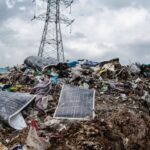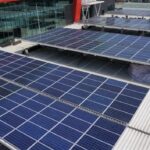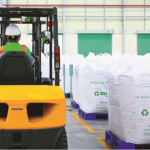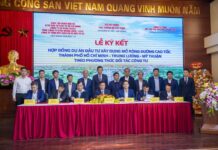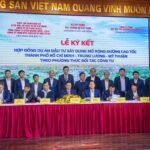At the seminar marking the 35th anniversary of the Vietnam Plastics Association, Mr. Tran Duy Hy, Chairman of the Board of Directors of Duytan Recycling Joint Stock Company (Duytan Recycling), recounted a journey filled with challenges yet brimming with inspiration. He transitioned from being a leader in the consumer plastics industry to becoming a pioneer in the circular economy.
Born in 1959 in Vinh Long and a graduate in mechanical engineering from Ho Chi Minh City University of Technology, Mr. Hy, at the age of 28, co-founded the Duy Tan Plastics Production Complex with his wife (later known as Duy Tan Plastics Production Joint Stock Company). The company’s name combines “Duy,” his middle name in a family with many siblings sharing the same first name, and “Tan,” symbolizing innovation. After 38 years of development, Duy Tan Plastics has become one of Vietnam’s largest plastics companies, with five factories in the South, exporting products to over 60 countries. It is also a packaging supplier for multinational corporations such as Unilever, Nestlé, Lavie, Coca-Cola, and Pepsi.
Despite this success, Mr. Hy shared that it led to many sleepless nights. “Five to seven years ago, everywhere I went, people talked about plastic pollution. Producing hundreds of tons daily, I began to feel concerned and realized my responsibility toward the environment,” he recalled.
Beyond societal pressure, Duy Tan Plastics’ major clients also demanded change. Corporations like Unilever, Coca-Cola, and Pepsi faced pressure to reduce plastic waste, committing to using 50% recycled materials by 2030 and 100% by 2040. However, they needed a reliable supply source.
“These corporations encouraged me to venture into recycling. They pointed out that importing recycled materials from Europe or the U.S. was akin to importing other countries’ waste, while no one was addressing their waste in Vietnam. They wanted the recycled packaging to be produced by Vietnamese companies and promised to purchase all the output if I invested,” Mr. Hy remembered.
In 2017, his group of shareholders decided to establish Duytan Recycling Joint Stock Company (Duytan Recycling). This decision surprised many, as Mr. Hy was nearly 60 at the time. “Friends asked why I was starting over at this age. I explained that the plastics and recycling industries are closely linked. The key is choosing the right direction and having sufficient capital,” he said with a smile.

Mr. Tran Duy Hy (holding the microphone) shares his second startup journey at the 35th anniversary of the Vietnam Plastics Association – Photo: Tu Kinh
|
Mounting Challenges
Instead of opting for a low-cost, manual recycling model that causes pollution, Mr. Hy invested heavily in building a state-of-the-art factory in the region. In June 2019, Duy Tan Recycling Plant broke ground in Duc Hoa Ha Industrial Park (former Long An), covering 65,000 square meters with an annual capacity of 100,000 tons.
The factory employs mechanical recycling technology. Plastic waste is crushed, washed, separated, compressed, and standardized. All machinery is imported from Europe, utilizing the Bottle-to-Bottle process, where each used plastic bottle is transformed into plastic pellets for producing new bottles, reducing reliance on fossil raw materials.
However, investment was just the beginning. The biggest challenge was obtaining international certifications to supply global brands. Duytan Recycling’s products had to meet stringent standards set by the FDA (U.S. Food and Drug Administration) and EFSA (European Food Safety Authority), ensuring they are free from harmful contaminants and safe for food contact.
“It took nearly two years of testing, evaluation, and approval to gain acceptance. It was an extremely arduous phase,” he shared.
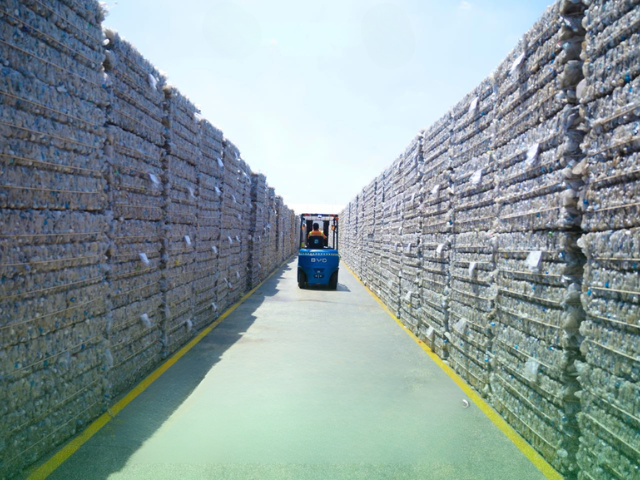
Plastic waste inside Duytan Recycling’s factory – Photo: Duytan Recycling
|
The domestic market presented another challenge. Due to stringent production processes, recycled plastic prices are 30-40% higher than virgin plastic, while Vietnam lacks mandatory recycled content regulations like those in Europe or the U.S. Mr. Hy noted that local businesses have little incentive to switch, limiting domestic consumption and causing near-stalemate periods.
Export opportunities have opened sustainable avenues for Duytan Recycling. Leveraging its California-based subsidiary with over 14 years of experience supplying packaging to U.S. companies, along with prestigious international certifications, the company’s products quickly gained traction in developed markets. Currently, over 60% of Duytan Recycling’s output is exported, with the remainder consumed domestically. This year, the factory’s capacity is expected to increase by 50%, following a nearly 40% expansion last year.
Nevertheless, the export path is not without hurdles. When shipping to the U.S., Duytan Recycling faced a 20% tax under Trump-era policies; in Europe, the company faced anti-dumping lawsuits due to the lack of separate HS codes for virgin and recycled plastics.
At the seminar, Mr. Hy urged the government to mandate recycled plastic content in products, encouraging domestic consumption and reducing cost pressures. He also called for separate HS codes for recycled and virgin plastics to avoid unnecessary export complications. “With the right policies, we’re ready to invest in one or two more factories,” he stated.
Mr. Dinh Duc Thang, Chairman of the Vietnam Plastics Association, hailed Mr. Tran Duy Hy as “a pillar of Vietnam’s plastics industry,” not only for embracing the green economy trend but also for demonstrating rare social responsibility as an industrialist. He emphasized that Mr. Hy’s Duytan Recycling project is “a pioneering model in the region, investing thousands of billions of dong with G7-level technology, the most advanced in Southeast Asia.
According to Mr. Thang, Mr. Tran Duy Hy’s example has “sounded a rallying call for Vietnamese businesses to enter the circular economy,” shifting perceptions of plastic waste from a burden to a valuable renewable resource.
|
Duy Tan Plastics Acquired by Thai Group In June 2025, Thailand’s SCG Group officially gained 100% ownership of Duy Tan Plastics Production Joint Stock Company after its subsidiary, SCG Packaging (SCGP), spent over 2.8 trillion VND to acquire the remaining 30% stake. The deal valued Duy Tan Plastics at over 9.4 trillion VND. This move aligns with SCGP’s expansion strategy in Southeast Asia, with Vietnam as a key market. Increased ownership allows the Thai group to complete its packaging supply chain and optimize operations in Vietnam, where Duy Tan Plastics leads in rigid plastics and consumer packaging. Previously, in 2021, SCGP invested approximately 3.6 trillion VND to acquire 70% of Duy Tan Plastics. In 2024, Duy Tan Plastics reported revenue of 5.4 trillion VND, after-tax profit of 578 billion VND, and total assets exceeding 4.6 trillion VND. |
SCG Group Takes Full Ownership of Duy Tan Plastics, Valued at Over 9.4 Trillion VND
– 14:06 24/10/2025
Optimizing Operations: Strategies for Efficient Management of the World’s Second-Largest Waste-to-Energy Plant
The Sóc Sơn Waste-to-Energy Plant in Hanoi has officially commenced operations. Designed to process 5,000 tons of waste daily and generate approximately 90 MW of electricity, this facility is hailed as a technological breakthrough. It serves as a pivotal solution to Hanoi’s waste management challenges while propelling the city closer to its goal of achieving a circular economy.
Why Rooftop Solar Installation Requires Notification: Insights from the Head of the Electricity Authority
Farmers grappling with high investment costs can find solace in the Director of the Electricity Department’s compelling reasons to embrace rooftop solar power installation without delay.
Unlocking Circular Economy: Recycling as the Key, Says Vietnam Plastics Association Chairman
For years, plastic has been widely regarded as a primary culprit of environmental pollution. However, according to Đinh Đức Thắng, Chairman of the Vietnam Plastics Association, when properly managed, plastic can transform into a vital renewable resource. This not only conserves energy but also reduces emissions and supports green growth objectives.

